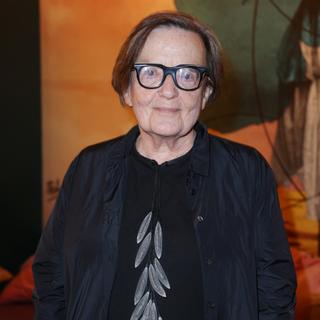


Filmmaker Agnieszka Holland: 'I've always felt the Second World War wasn't really over'
InterviewThe Polish director, whose film Green Border was released in France this month, speaks to Le Monde about going to film school in Prague, moving to France, and the issues facing Poland today.
Agnieszka Holland grew up under communist dictatorship. At 13, her father died after he threw himself out of a window after being falsely accused of espionage by the regime. The trials and tribulations of her life have given her the strength to pursue a remarkable career as a filmmaker in Poland, France and the US. At 75, the committed filmmaker, who has fought the nationalist populism of the Law and Justice party (PiS), has been the target of violent attacks by the Polish conservative right for her latest feature, Green Border (winner of the Special Jury Prize at the Venice Film Festival), which deals with the plight of migrants between Belarus and Poland.
I wouldn't have gotten here if...
If my mother hadn't had faith in me. She raised me with the idea that I was special but also privileged. I could do whatever I wanted, but I had to share. Every time I wanted a toy, a doll, and got it, she would tell me the story of a child she knew, sick or poorer, who wasn't as lucky as I was and invite me to give them what I'd just received. She taught me not to get attached to material things.
What was your mother like?
She was beautiful and tender, yet lacking in self-confidence. Her mother died when she was 6 months old. Her father remarried a woman who wasn't very loving. I understood just how deeply my mother was marked by this childhood wound. She was born into a Catholic family but lost her faith very early on. She had prayed so hard – in vain – for her mother to come back that she thought God didn't exist.
Where do your maternal grandparents come from?
My grandfather came from a large, very poor farming family. He became a schoolteacher. At the time my mother was born, he was a school inspector in the Volhynia region [now in Ukraine]. The children there spoke Ukrainian, but the government, which wanted to show that the region was "Polonized," asked my father to falsify the statistics, which he refused to do. He was thrown out of his job. As someone who started from very low, he took rights and duties very seriously. This attitude influenced my mother and, in a way, also my own character.
What about your father?
He came from a Jewish family, also quite poor, but with high ambitions for their only son. He was very gifted. He studied medicine at a time when it was very difficult for Jews to gain access to it. My grandparents died in the Warsaw ghetto before the great deportation of the Jews. The brothers and sisters of my grandfather, who was a tailor, all died in the Holocaust. My father joined the Young Communists at a very early age. Later, when the Germans attacked the Soviet Union, he joined the Red Army. And when Stalin created a second Polish army, he joined up and marched to Berlin. After the war, he worked for a communist youth newspaper. He was a fervent Stalinist. But, at the same time, he was a rebellious man who didn't take too kindly to the party leaders. He soon got into trouble.
You have 75% of this article left to read. The rest is for subscribers only.
